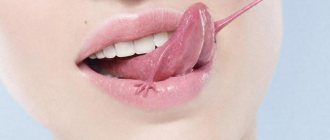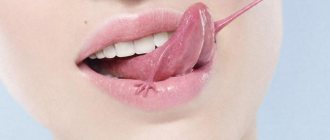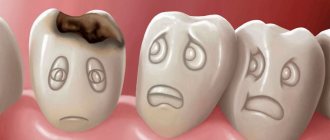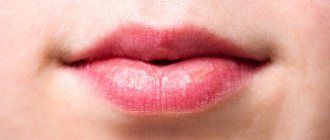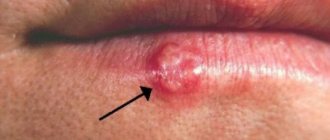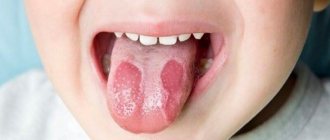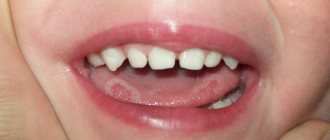General information
Glossalgia refers to diseases of the tongue, as the sympathocomplex has a number of causes: neurogenic, symptomatic, ischemic, caused by local factors. Usually the process is polyethylogical and does not cause morphological changes; it is expressed in the form of paresthesia and hyperesthesia , which are felt as a burning sensation and perversion of taste.
The course is long-term, from several months to several years, and is associated with systemic diseases, psychological disorders or depression .
Very often, the burned oral mucosa is considered exclusively as one of the symptoms of systemic diseases, especially those affecting the nervous system, and through local irritants, glossodynia manifests itself and increases discomfort, leading to relapse.
Treatment of glossodynia
Treatment goes through several stages. First of all, when risk factors are identified, their elimination begins:
- A complete sanitation of the oral cavity is carried out;
- High-quality fillings are placed;
- Rational prosthetics or re-prosthetics are carried out;
- Correction of the bite (its height in particular);
- Treatment of oral pathologies.
At the same time, treatment of the psycho-emotional environment is carried out. This therapy includes sedative and sedative medications. They are selected depending on the initial condition, but preference is still given to lighter medicines on a natural herbal or homeopathic basis. But if serious psycho-emotional problems are identified, they may prescribe the use of tranquilizers, sedatives, antidepressants and strong antipsychotics, which are prescribed by prescription.
This type of treatment cannot be abandoned, otherwise analgesics will only mask the problem for a while. For severe pain, agents with a local anesthetic effect can be used, which usually include lidocaine, benzocaine or novocaine. But long-term use can reduce the effectiveness of the drug, and therefore, first of all, deal with the elimination of the root causes.
The next stages of full recovery are:
- Identification of pathologies of internal organ systems - heart, blood vessels, gastrointestinal tract, endocrine system with the appointment of adequate therapy;
- Physiotherapeutic treatment;
- Spa treatment.
Treatment for glossodynia also takes some time. Therefore, you need to be patient. If there are external factors that provoke this disease, then you should begin to eliminate them. The patient should avoid stress and, if possible, get rid of bad habits. You should also not refuse psychotherapy, since it will help you find the true roots of the problem.
The patient is monitored by neurologists and a dentist, as well as those specialists whose pathologies have been identified. In general, glossodynia can occur for many years without treatment, without causing complications. Accordingly, this pathology only causes discomfort, but does not directly pose a threat to life and health.
Sources used:
- Notes of a good dentist / E.G. Aghajanyan. - M.: Omega, 2011.
- James, William D.; Berger, Timothy G.; et al. Andrews' Diseases of the Skin: Clinical Dermatology. — Saunders Elsevier, 2006.
- Treatment of diseases of gums and teeth using traditional and non-traditional methods / E.L. Isaeva. - M.
- National Library of Medicine (USA)
Pathogenesis
Pain localized in the tongue area is not a manifestation of a visible inflammatory process or the result of morphological changes.
The symptom complex of glossalgia is usually caused by damage to the autonomic nervous system, which are formed against the background of chronic somatic diseases of the digestive system, as a result of vascular and endocrine disorders. The development mechanism may be based on:
- allergic reactions;
- action of galvanic currents;
- disruption of salivation (salivation);
- decrease in the threshold for the perception of irritation.
Classification
With neurogenic development factors, burning pain syndrome is called glossodynia . It is an organic pathology of the nervous system and is usually caused by neuralgia , neuropathies of the lingual or glossopharyngeal nerve , ganglionitis of the submandibular or sublingual autonomic node , irritation of pain from the cervical part of the autonomic trunk or functional pathology with sympathalgia , a paresthetic sensory phenomenon against the background of bulbar disorders.
Glossodynia is more common in women over 30. Depending on the form and location of paresthesia, they are distinguished:
- mucosal glossopharyngeal form of glossodynia - concentrated on the root of the tongue, pharynx and cervical region of the esophagus;
- dermatomucosal form - when not only the oral mucosa is burned, but also the skin of the face.
Glossalgia is a particular manifestation of stomalgia , a disease manifested by constant pain and paresthesia of the mucous membranes and organs of the oral cavity. The burning sensation spreads not only to the tongue, but also to the palate, gums, mucous membranes of the cheeks, and throat.
Factors influencing development
It has been proven that this disease most often affects females - approximately three quarters of patients are female, which is explained by the structural features of the nervous system and its greater sensitivity to irritants. Glossodynia or glossalgia can develop under the influence of a number of reasons, including local and general ones. Common ones include:
- Gastrointestinal diseases;
- Psycho-emotional factors - worries, stress, fears, fatigue, irritability, and so on;
- Obsessive-compulsive neuroses such as cancerophobia or syphilophobia;
- Diseases of the endocrine system, for example, diabetes;
- Diseases of the heart and blood vessels;
- Iron deficiency.
Local factors relate directly to the oral cavity. They can develop both under external influence and due to internal reasons:
- Poor-quality fillings and prostheses that cause chronic injury to soft tissues;
- Diseases of periodontal tissues;
- Galvanosis;
- Pathological abrasion of teeth;
- Difficulty in teething;
- Surgical interventions in the presented area;
- Anatomical deviation in the structure of the temporomandibular joint, its deformation;
- Diseases of the oral cavity of an allergic nature, which include medicinal stomatitis;
- Tongue biting is a bad habit.
It has been proven that a combination of even two factors can cause such a deviation in the functioning of the nervous system as glossodynia. In this case, two specialists must deal with the treatment of pathology at once - a dentist and a neurologist.
In some types of phobias, pain in the tongue develops as a psycho-emotional response of the subconscious to an event that has occurred or is occurring. Such situations are referred to as “swallowed tongue” or “bitten tongue.” Often this disorder can develop due to fear of oral sex.
Causes
The development of burnt tongue syndrome can be triggered by local factors:
- dental diseases, such as caries ;
- procedures in dental offices - filling, tooth extraction, etc.;
- chronic microtrauma and impaired capillary circulation;
- eating foods that irritate the oral mucosa;
- the presence of metal orthopedic structures and acrylic plastics in the oral cavity;
- pathology of the bite or temporomandibular joints - up to 17% of cases.
The mucous membrane in the mouth seems to be burned, it can be for no apparent reason (idiopathic) or due to systemic factors:
- taking medications that are ACE inhibitors (angiotensin converting enzyme);
- emotional stress and burnout;
- diseases of the digestive system (in 70% of cases), including decreased secretion of gastric juice, chronic colitis, gastritis, peptic ulcer ;
- diseases of the cardiovascular system such as ischemic and hypertension , atherosclerosis , etc.;
- endocrinology problems - disruption of the hypothalamus, decreased levels of thyroid hormones;
- hypovitaminosis;
- liver diseases, for example, hepatitis and cholecystitis, cause glossalgia in approximately 10%;
- infectious ( neurosyphilis ) and traumatic lesions of the nervous system.
Diagnosis
Despite the rather specific symptoms, glossodynia is in many ways similar to other pathologies. Therefore, during the diagnostic process, it is very important to separate it from similar diseases, since they are treated differently. Pathologies with similar manifestations are considered:
- Desquamative glossitis. With it, foci of desquamation form on the surface of the tongue. They cause the patient a feeling of discomfort. pain occurs most often when eating or drinking, especially with irritating foods - sour, salty, spicy.
- Catarrhal glossitis is manifested by noticeable inflammation of the mucous membrane of the tongue. It manifests itself as obvious swelling, hyperemia, and pain when touched.
- Injury. Can be acute or chronic. With this type, a clear source of pain appears with the wound surface. In the chronic form, the wound becomes a decubital ulcer.
- Galvanosis is a pathology that develops when dissimilar metals are present in the oral cavity, for example, at the crown and denture. In the mouth there is a sensation of current passing through the surface of the tongue, as well as a metallic taste and burning sensation.
- Trigeminal neuralgia and hypoglossal neuritis. It manifests itself as twitching pain, which is usually paroxysmal in nature with periodic outbreaks of pain, immediately followed by relief.
Often, in the process of determining a specific type of pathology, problems arise precisely because of the similarity of symptoms or its vagueness, when the patient is not able to accurately describe sensations, and external manifestations are not expressed.
Some of these diseases are themselves the root cause of the development of glossodynia. Therefore, a broader consideration of the picture may be required to determine subsequent treatment tactics.
Symptoms
Unpleasant and painful sensations with glossalgia are hyperesthesia - increased sensitivity and paresthesia - a sensitivity disorder, expressed in the form of burning and tingling sensations. Most often, patients describe the condition as follows:
- mouth feels like it's burned;
- the tongue seems to be sprinkled with pepper;
- it looks like he was scalded by boiling water.
In addition, glossalgic syndrome can cause:
- increased anxiety, sleep disturbances and panic attacks;
- dryness and discomfort in the mouth;
- numbness of the tongue;
- deterioration of diction;
- dulling and distortion of taste sensations;
- feeling of swelling of lips and tongue;
- distortion of smell perception ( dysosmia );
- the presence of a metallic, bitter or sour taste ( dysgeusia ).
Features of pain syndrome
The pain syndrome may differ from patient to patient - for some it is mild, for others it is painful and intolerable.
Important! With glossalgia, symptoms appear closer to the afternoon and may disappear at night and during meals. Pain and burning are usually localized - at the tip, at the root of the tongue, or, on the one hand, sometimes changes its location over time.
Main symptoms
The main symptoms, as mentioned earlier, appear either constantly or in outbreaks. Attacks can last from a couple of minutes to several days. Pain with glossalgia is characterized by various terms or comparisons:
- Rawness;
- Numbness;
- Burning;
- Pressure;
- Withdrawal.
In parallel, glossodynia of the tongue can manifest itself:
- Diffuse pain or with a clear boundary on the tongue;
- Is only the surface of the tongue affected or does the sensation spread to adjacent areas;
- Unilateral or bilateral pain;
- Feeling of heaviness, awkwardness, clumsiness, swelling of the tongue;
- Dryness of the mucous membrane of the tongue;
- Distortion of speech due to desire spares him from excess movement - dysarthria, slurred speech.
Since pain usually disappears when eating, such patients always have food with them, which they eat to relieve pain and discomfort. There are practically no other changes in the appearance of the patient’s tongue, except that there may be inexpressive hyperemia, swelling and plaque, as mentioned above. Salivation is also disrupted, in which it either decreases or exceeds the norm.
Patients often attribute some unpleasant sensations to fatigue, exhaustion, long conversations, errors in diet, or tooth extraction.
Tests and diagnostics
To make a diagnosis of burning tongue syndrome, it is necessary to exclude candidiasis , lichen planus , stomatitis and other infectious and allergic diseases.
After collecting anamnesis data, examination and examination of the patient, it is necessary to conduct allergy tests .
For targeted treatment of gastroenterological and other somatic diseases, it is important to conduct a clinical assessment of the condition of the oral cavity:
- pallor of the integument may indicate suspicion of diabetes mellitus , erythremia and anemia ;
- the presence of areas of desquamation - about intestinal dysbiosis and peptic ulcer;
- hyperkeratosis indicates hepatitis and kidney dysfunction;
- aphthae and ulcers - can be manifestations of Crohn's disease , ulcerative colitis , pathologies of the cardiovascular system.
Prevention
Preventive measures for diseases of the oral cavity and, in particular, the tongue are:
- giving up tobacco, hookah, electronic cigarettes and alcohol;
- daily high-quality hygiene and the use of mouth rinses that do not contain alcohol and toothpastes - without sodium lauryl sulfate;
- visit the dentist at least once a year;
- avoiding microtrauma of the tongue, for example, when using low-quality artificial onlays on teeth (veneers), when shelling seeds, eating food with sharp edges - candies, crackers, chips, nuts, apples with a hard crust;
- following a gentle healthy hypoallergenic diet.
Diet for glossalgia
Diet Table No. 1
- Efficacy: therapeutic effect after 3 weeks
- Terms: 2 months or more
- Cost of products: 1500 - 1600 rubles. in Week
At the first manifestations of systemic diseases, such as dry mouth, burning, tingling or pain, it is best to switch to a healthy diet. To make the diet also therapeutic:
- give up pickles, smoked meats, spicy and too sour foods;
- say no to “junk food” - crackers, chips, cookies, candies and street products - shawarma, hot dogs, junk food - semi-finished products, sausages, bakery products;
- do not eat too cold or too hot foods;
- Enrich your diet with fruit drinks, compotes, vegetable purees and pureed cream soups.


